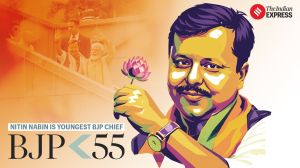Click here to follow Screen Digital on YouTube and stay updated with the latest from the world of cinema.
Tea-Rex vs Mufflerman
Collective self-censorship seems to have erased all evidence of the various anarchies that ruled Delhi.
In honour of Arvind Kejriwal’s swan song — with his family in the audience — TV cameras were allowed into the Delhi assembly on Friday morning. But it had the unfortunate consequence of encouraging legislators to stand about, holding placards up to the cameras, speaking the language of street protest in the House. AAP effect?
Delhi’s murmuring classes like to theorise that the Congress propped up Mufflerman’s government so that he would cut into Tea-Rex Narendra Modi’s media mileage. And as the BJP rolled out its tea for sympathy campaign, Kejriwal gave good fight, issuing FIRs like scattershot, rewarding citizens for not paying their dues and exulting at having exposed “match-fixing” between the Congress and the BJP in the assembly. Microphones picked up enraged shouts from his press conference on Thursday: “Kya kar raha hai, yaar, kya kar raha hai, be?” A lively vernacular paraphrase of every anchor’s response to Kejriwal’s latest doings, but these were protests from cameramen about an anarchic peer, who had leapt into their midst, rocking and shocking the sea of cameras.
But collective self-censorship seems to have erased all evidence of the various anarchies that ruled Delhi. There is no video trace of Delhi Law Minister Somnath Bharti being handed lipstick and bangles, a sexist message suggesting that he stay at home, or of ginger and matches being thrust upon Kejriwal by Congress man Jai Kishan, who had to be brought on camera to explain the symbolism. These are references to monkeys, beings who can neither appreciate the good things of life like ginger, and cannot use sophisticated tools like matches. Animals and women were denigrated by these gifts, but it seemed to cause no anxiety in the House.
But Arnab Goswami was not so supine about the gassing of Parliament (“gassing” was the word), which also happened off-camera. He demanded that an apology be delivered immediately to the real victims of the outrage: “You have let down the little children, the schoolchildren who come to visit Parliament with their water bottles…” Not too much sympathy for the legislators who got gassed.
In fact, the outrage voiced and the punitive measures suggested by panelists on numerous channels were almost as bad as the outrages in Parliament. Times Now suggested that Pranab Mukherjee would not be an “ethical president” if he did not read the riot act, instead of allowing the Speaker to deal with the matter. A panelist was quite sure that Parliament should be dissolved, an extreme consequence for parliamentarians who would not dream of using pepper spray, and who make up the majority of the House.
But one wishes that they had been half as angry about a matter that is perhaps larger than the question of maintaining the dignity of parliamentary debate — maintaining propriety in public debate per se, whether within or without the House. The ease with which an obscure Hindutva organisation has forced the world’s biggest English publishing conglomerate to pulp Wendy Doniger’s book is a terrifying precedent, but the media hauled out the tired old arguments, from the pristine beauty of free speech to the paradoxical popularity of Khajuraho among straitlaced Hindus.
But on Nidhi Razdan’s show, Pavan K Verma demonstrated, quite conversationally, that he had actually read about Hinduism, while his opponent, the triumphant Dina Nath Batra, had only sought to have his prejudices confirmed. The media should look at such intelligent strategies to beat the culture of banning, which threatens them. On Razdan’s show, for instance, Batra made anatomical references that could have drawn obscenity lawsuits from the public. Now, that was thought-provoking…
pratik.kanjilal@expressindia.com
- 01
- 02
- 03
- 04
- 05


































